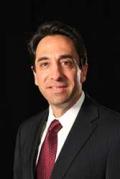Law students at Hasting Law School, Boalt Hall, and Santa Clara University are providing services to low-income people with legal problems in the workplace. Santa Clara Law's clinical program gives students academic credit for taking one of two courses allowing them to do the hands-on legal work. There are about 21 Santa Clara Law students participating this summer.
At Santa Clara Law, the goals of the clinical program go beyond teaching practical lawyering skills - although that goal does figure prominently in the clinical program. With a Jesuit history, says Alvarez, there is also a sense of professionalism, social justice, and compassion that advisors try to instill in
law students, who are taught to "treat people non-judgmentally, carefully, and with respect," says Alvarez.
On the legal skills side, Alvarez focuses on letting the students handle the cases, providing supervision and answering questions. "I see this place as a law office," Alvarez says of the clinic.
Brandon Walker, who has just finished his first year at Santa Clara Law, went looking for some "real work experience this summer," and ended up with a case set to go to trial this month. He had not expected to be arguing before a judge on behalf of a client - but he was "pleasantly surprised to have this opportunity," he says.
Walker is taking the Clinical Skills course this summer, and through that he is participating in the workers' rights clinic at Santa Clara Law. Walker sees the summer after first year as being "all about getting experience." At law firms, the tasks for a law student in his first summer may not be very interesting, says Walker, whereas in a clinic, a student has a chance to be centrally involved in real cases.
The case that Walker and his colleague will take to court involves a man who was denied workers' compensation benefits because the insurance company will not pay his claim. The company says the activity he was doing (during which he was injured) was not work-related. The man first came to the Santa Clara Law clinic in 2002, was taken on as a client, and has moved through the system with students helping him and then moving on over the years.
At the beginning of June, the case came to Walker and another clinic student. Alvarez is their supervising attorney. The stack of files for the case was one-and-a-half-feet-high, says Walker. With the research mostly done, and several negotiation attempts made, no settlement could be reached, and so the case will get underway this month. For their side, Walker and his colleague must show that the client believed the activity in question to be part of his job, and also that this belief was reasonable.
The case will go before an Administrative Law Judge in the Workers' Compensation Division, and it will be Walker's first appearance before a judge. He is, understandably, a little nervous. His only point of comparison so far is preparing for law school final exams, but case preparation is a more "prolonged, intense feeling," he says.
Nicole Jones will be going into her third year of law school at Santa Clara, and wanted to work in the workers' rights clinic this summer, seeing it as a "great opportunity to get involved," she says. She, like some students doing this clinic, is working with an outside attorney on one case.
While Alvarez heads up the workers' rights arm of the clinical program at Santa Clara, there are many attorneys who volunteer to work with law students through the Bay Area Workers' Rights Clinics program.
Jones's case is a common situation seen at the clinic - or, rather, many common situations all rolled in to one person's experience. The issue is a wage-an-hour violation, with the client being underpaid on several fronts. The client originally came in after five pay periods with no payment; the employer was claming that, since the man is old, he forgot that they had paid him.
"Then we did the math from his pay stubs," says Jones, and realized that the client was only being paid $4.00 per hour. Also, they learned that he was not receiving paid meal or rest breaks, was working seven days a week, and then was fired and not paid a last paycheck. Many clients are like this, says Jones, with one legal problem they bring to the clinic revealing many others during the intake interview.
Jones's interest in
employment law is growing because of her experiences so far at the clinic, she says. Having her own clients "really makes it come alive," she says; "you really feel you're able to help people."





